英语词汇辨析
英语词汇词性辨析方法
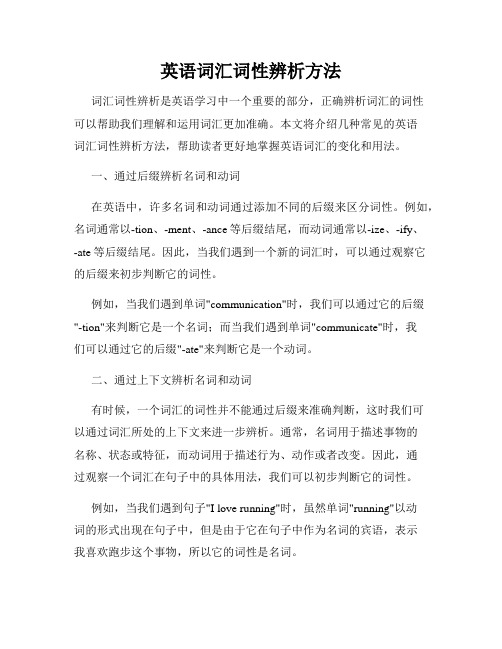
英语词汇词性辨析方法词汇词性辨析是英语学习中一个重要的部分,正确辨析词汇的词性可以帮助我们理解和运用词汇更加准确。
本文将介绍几种常见的英语词汇词性辨析方法,帮助读者更好地掌握英语词汇的变化和用法。
一、通过后缀辨析名词和动词在英语中,许多名词和动词通过添加不同的后缀来区分词性。
例如,名词通常以-tion、-ment、-ance等后缀结尾,而动词通常以-ize、-ify、-ate等后缀结尾。
因此,当我们遇到一个新的词汇时,可以通过观察它的后缀来初步判断它的词性。
例如,当我们遇到单词"communication"时,我们可以通过它的后缀"-tion"来判断它是一个名词;而当我们遇到单词"communicate"时,我们可以通过它的后缀"-ate"来判断它是一个动词。
二、通过上下文辨析名词和动词有时候,一个词汇的词性并不能通过后缀来准确判断,这时我们可以通过词汇所处的上下文来进一步辨析。
通常,名词用于描述事物的名称、状态或特征,而动词用于描述行为、动作或者改变。
因此,通过观察一个词汇在句子中的具体用法,我们可以初步判断它的词性。
例如,当我们遇到句子"I love running"时,虽然单词"running"以动词的形式出现在句子中,但是由于它在句子中作为名词的宾语,表示我喜欢跑步这个事物,所以它的词性是名词。
三、通过词义辨析形容词和副词形容词用于修饰名词,描述事物的特征或状态,而副词用于修饰动词、形容词或其他副词,描述行为的方式、程度或频率。
因此,通过观察一个词汇在句子中所起的修饰作用,我们可以初步判断它的词性。
例如,当我们遇到句子"She sings beautifully"时,单词"beautifully"用于修饰动词"sings",描述她的歌唱方式,所以它的词性是副词。
英语翻译中的词汇辨析
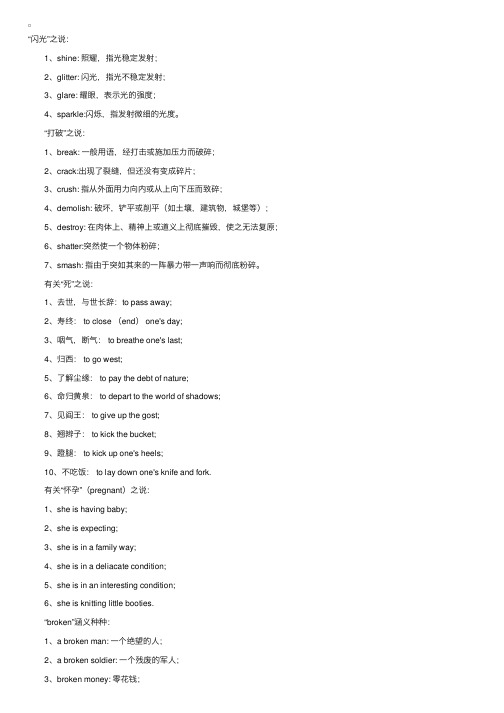
“闪光”之说: 1、shine: 照耀,指光稳定发射; 2、glitter: 闪光,指光不稳定发射; 3、glare: 耀眼,表⽰光的强度; 4、sparkle:闪烁,指发射微细的光度。
“打破”之说: 1、break: ⼀般⽤语,经打击或施加压⼒⽽破碎; 2、crack:出现了裂缝,但还没有变成碎⽚; 3、crush: 指从外⾯⽤⼒向内或从上向下压⽽致碎; 4、demolish: 破坏,铲平或削平(如⼟壤,建筑物,城堡等); 5、destroy: 在⾁体上、精神上或道义上彻底摧毁,使之⽆法复原; 6、shatter:突然使⼀个物体粉碎; 7、smash: 指由于突如其来的⼀阵暴⼒带⼀声响⽽彻底粉碎。
有关“死”之说: 1、去世,与世长辞:to pass away; 2、寿终: to close (end) one's day; 3、咽⽓,断⽓: to breathe one's last; 4、归西: to go west; 5、了解尘缘: to pay the debt of nature; 6、命归黄泉: to depart to the world of shadows; 7、见阎王: to give up the gost; 8、翘辫⼦: to kick the bucket; 9、蹬腿: to kick up one's heels; 10、不吃饭: to lay down one's knife and fork. 有关“怀孕”(pregnant)之说: 1、she is having baby; 2、she is expecting; 3、she is in a family way; 4、she is in a deliacate condition; 5、she is in an interesting condition; 6、she is knitting little booties. “broken”涵义种种: 1、a broken man: ⼀个绝望的⼈; 2、a broken soldier: ⼀个残废的军⼈; 3、broken money: 零花钱; 4、a broken promise: 背弃的诺⾔; 5、broken English: 蹩脚的英语; 6、a broken spirit: 消沉的意志; 7、a broken heart: 破碎的⼼。
英语常用词语辨析
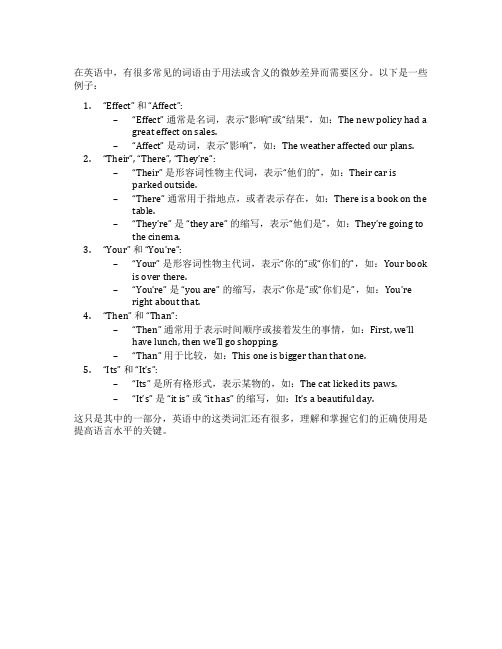
在英语中,有很多常见的词语由于用法或含义的微妙差异而需要区分。
以下是一些例子:1.“Effect” 和“Affect”:–“Effect” 通常是名词,表示“影响”或“结果”,如:The new policy had a great effect on sales.–“Affect” 是动词,表示“影响”,如:The weather affected our plans. 2.“Their”, “There”, “They’re”:–“Their” 是形容词性物主代词,表示“他们的”,如:Their car isparked outside.–“There” 通常用于指地点,或者表示存在,如:There is a book on the table.–“They’re” 是“they are” 的缩写,表示“他们是”,如:They’re going to the cinema.3.“Your” 和“You’re”:–“Your” 是形容词性物主代词,表示“你的”或“你们的”,如:Your book is over there.–“You’re” 是“you are” 的缩写,表示“你是”或“你们是”,如:You’re right about that.4.“Then” 和“Than”:–“Then” 通常用于表示时间顺序或接着发生的事情,如:First, we’ll have lunch, then we’ll go shopping.–“Than” 用于比较,如:This one is bigger than that one.5.“Its” 和“It’s”:–“Its” 是所有格形式,表示某物的,如:The cat licked its paws.–“It’s” 是“it is” 或“it has” 的缩写,如:It’s a beautiful day.这只是其中的一部分,英语中的这类词汇还有很多,理解和掌握它们的正确使用是提高语言水平的关键。
英语词汇辨析
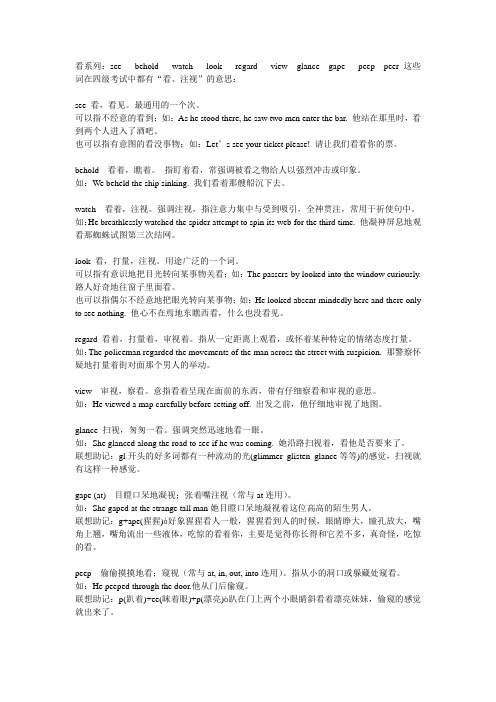
看系列:see behold watch look regard view glance gape peep peer 这些词在四级考试中都有“看、注视”的意思:see 看,看见。
最通用的一个次。
可以指不经意的看到;如:As he stood there, he saw two men enter the bar. 他站在那里时,看到两个人进入了酒吧。
也可以指有意图的看没事物;如:Let’s see your ticket please! 请让我们看看你的票。
behold 看着,瞧着。
指盯着看,常强调被看之物给人以强烈冲击或印象。
如:We beheld the ship sinking. 我们看着那艘船沉下去。
watch 看着,注视。
强调注视,指注意力集中与受到吸引,全神贯注,常用于祈使句中。
如:He breathlessly watched the spider attempt to spin its web for the third time. 他凝神屏息地观看那蜘蛛试图第三次结网。
look 看,打量,注视。
用途广泛的一个词。
可以指有意识地把目光转向某事物关看;如:The passers-by looked into the window curiously. 路人好奇地往窗子里面看。
也可以指偶尔不经意地把眼光转向某事物;如:He looked absent-mindedly here and there only to see nothing. 他心不在焉地东瞧西看,什么也没看见。
regard 看着,打量着,审视着。
指从一定距离上观看,或怀着某种特定的情绪态度打量。
如:The policeman regarded the movements of the man across the street with suspicion. 那警察怀疑地打量着街对面那个男人的举动。
view 审视,察看。
英语词汇辨析方法
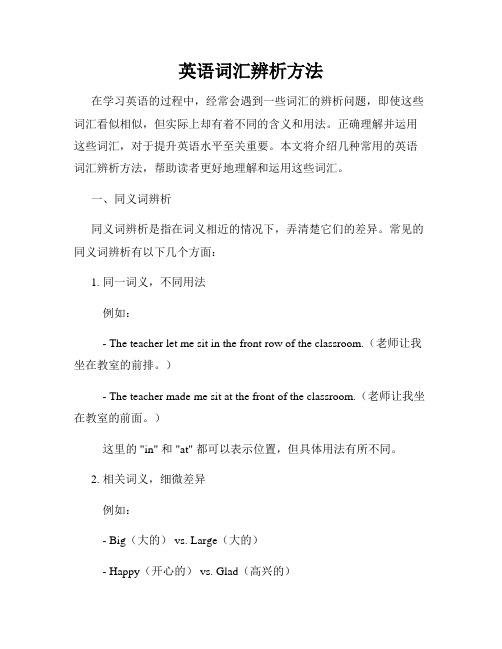
英语词汇辨析方法在学习英语的过程中,经常会遇到一些词汇的辨析问题,即使这些词汇看似相似,但实际上却有着不同的含义和用法。
正确理解并运用这些词汇,对于提升英语水平至关重要。
本文将介绍几种常用的英语词汇辨析方法,帮助读者更好地理解和运用这些词汇。
一、同义词辨析同义词辨析是指在词义相近的情况下,弄清楚它们的差异。
常见的同义词辨析有以下几个方面:1. 同一词义,不同用法例如:- The teacher let me sit in the front row of the classroom.(老师让我坐在教室的前排。
)- The teacher made me sit at the front of the classroom.(老师让我坐在教室的前面。
)这里的 "in" 和 "at" 都可以表示位置,但具体用法有所不同。
2. 相关词义,细微差异例如:- Big(大的) vs. Large(大的)- Happy(开心的) vs. Glad(高兴的)在某些情况下,这些词汇可以通用,但在特定的语境下会有微妙的差别。
3. 同义词的情感色彩例如:- Thin(瘦的) vs. Skinny(非常瘦的)- Small(小的) vs. Tiny(非常小的)这些词虽然意思相似,但在语气和感情色彩上有所不同。
在进行同义词辨析时,我们需要通过大量的阅读和实际运用来理解它们的细微差别,并且注意词性和用法上的不同。
二、反义词辨析反义词辨析是指在词义相反的情况下,正确理解并使用这些词汇。
常见的反义词辨析有以下几个方面:1. 直接相反的词义例如:- Arrive(到达) vs. Depart(离开)- Love(爱) vs. Hate(恨)这些词汇的词义非常直接,易于理解和运用。
2. 接近相反的词义例如:- Beautiful(美丽的) vs. Ugly(丑陋的)- Brave(勇敢的) vs. Cowardly(懦弱的)这些词汇在意义上虽然不是完全相反,但在描述事物或人物时存在着明显的对立关系。
英语专业常用词汇辨析

to smile one’s approval to smile one’s thanks to smile with a bitter smile to smile a forced smile Sentences: 1. He gave a satisfied smile. 2. He smiled to see her children so happy.
(4) clutch意为“突然抓住,并伴有 意为“ 意为 突然抓住, 急切、害怕的心理” 急切、害怕的心理”。 “ Clutch” means to seize or to take hold of sth. tightly with the fear of losing it. When people clutch sth. or clutch at sth., they hold it tightly with their hand, usually because they are afraid of sth.or anxious of sth.
(6) grip:to take and keep a : firm hold of; to seize sth. firmly, A grip is a firm, strong hold on sth. It also means to understand or comprehend sth.
4. We all go back to our bedroom after school. 5.They are discussing the problem air pollution in cities.
Use the following adjectives to complete the sentences: worth, worthy,worthwhile 1. The novel is reading. 2. The novel is to be read. 3. It is reading the novel. 4. To read the novel is .
英语易混淆词汇辨析

易混淆词汇辨析●adherence和adhesion这两个词都是“粘附的”意思。
adherence用于比喻的意思。
例如:His adherence to the strict letter of the law.adhesion是指物质上的。
●adjacent,adjoining,和contiguous这些词都有next to“紧挨”的意思。
adjacent“毗邻的,邻近的”,但它们可能并不相互直接接触。
adjoining和contiguous指相互接触,通常之间有一个edge或boundary.●admission和admittance它们都有“the act of entering”的意思。
但admission用于公共场合。
The price of admission to the gallery is£5.admittance不指公共场合,一般指私人的住所。
●adopted和adoptiveadopted“收养的,过继的”an adopted son(daughter)养子(女);my adopted country我所入籍的国家;adopted words外来语。
adoptive“收养的”,我们说adoptive parents,但很少说adoptive child;“采用的”,“假冒的”an adoptive courage假充勇敢。
●averse和adverseadverse“不利的,反对的”,用于事,不用于人。
adverse weather conditions;an adverse reaction.averse“嫌恶的,反对的,不乐意的”,常和“to”一起使用,而且用否定形式。
advise和adviceadvise“劝告”(动词);advice“劝告”(名词)。
英语专业四级词汇词义辨析
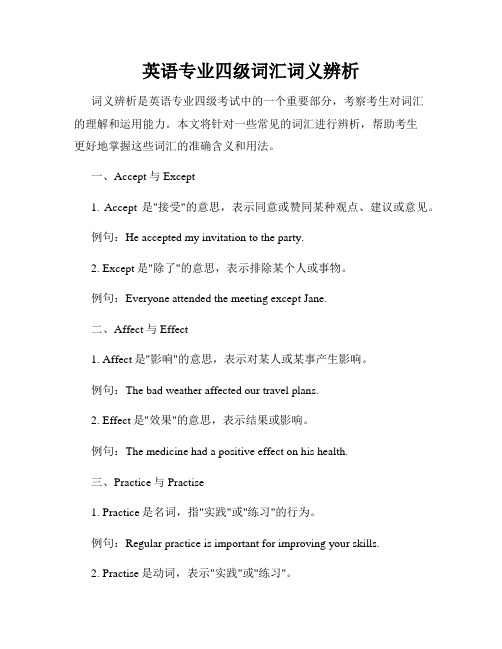
英语专业四级词汇词义辨析词义辨析是英语专业四级考试中的一个重要部分,考察考生对词汇的理解和运用能力。
本文将针对一些常见的词汇进行辨析,帮助考生更好地掌握这些词汇的准确含义和用法。
一、Accept与Except1. Accept是"接受"的意思,表示同意或赞同某种观点、建议或意见。
例句:He accepted my invitation to the party.2. Except是"除了"的意思,表示排除某个人或事物。
例句:Everyone attended the meeting except Jane.二、Affect与Effect1. Affect是"影响"的意思,表示对某人或某事产生影响。
例句:The bad weather affected our travel plans.2. Effect是"效果"的意思,表示结果或影响。
例句:The medicine had a positive effect on his health.三、Practice与Practise1. Practice是名词,指"实践"或"练习"的行为。
例句:Regular practice is important for improving your skills.2. Practise是动词,表示"实践"或"练习"。
例句:You should practise speaking English every day.四、Artificial与Artistic1. Artificial是形容词,表示"人造的"或"人工的"。
例句:She bought an artificial flower for decoration.2. Artistic是形容词,表示"艺术的"或"富有艺术感的"。
高中英语知识点归纳词汇词义辨析与运用
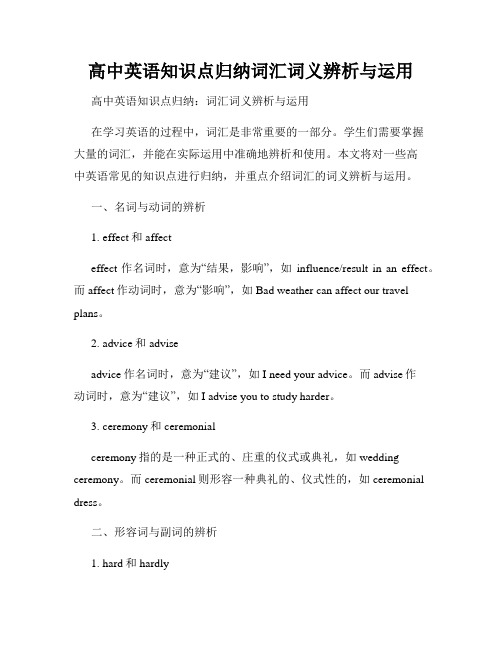
高中英语知识点归纳词汇词义辨析与运用高中英语知识点归纳:词汇词义辨析与运用在学习英语的过程中,词汇是非常重要的一部分。
学生们需要掌握大量的词汇,并能在实际运用中准确地辨析和使用。
本文将对一些高中英语常见的知识点进行归纳,并重点介绍词汇的词义辨析与运用。
一、名词与动词的辨析1. effect和affecteffect作名词时,意为“结果,影响”,如influence/result in an effect。
而affect作动词时,意为“影响”,如Bad weather can affect our travel plans。
2. advice和adviseadvice作名词时,意为“建议”,如I need your advice。
而advise作动词时,意为“建议”,如I advise you to study harder。
3. ceremony和ceremonialceremony指的是一种正式的、庄重的仪式或典礼,如wedding ceremony。
而ceremonial则形容一种典礼的、仪式性的,如ceremonial dress。
二、形容词与副词的辨析1. hard和hardlyhard作形容词时,意为“困难的”,如It's hard work。
而hardly作副词时,意为“几乎不”,如I hardly ever go to the cinema。
2. fast和fastlyfast作形容词时,意为“快的”,如a fast car。
而fastly虽然也是形容词,但在现代英语中几乎不用。
3. weak和weaklyweak作形容词时,意为“虚弱的”,如a weak person。
而weakly作副词时,意为“每周一次地”,如He visits his grandparents weakly。
三、动词的时态与语态的辨析1. do和makedo用来表示一般的动作或活动,如do homework。
英语词汇中的词义辨析与用法区别

英语词汇中的词义辨析与用法区别在英语学习中,我们经常会遇到一些词义相近的单词,很容易混淆它们的用法和含义。
为了更好地理解英语词汇的不同用法和区别,以下将对一些常见的词义辨析进行解析。
1. Accept vs. Except这两个单词在拼写上非常相似,但含义完全不同。
"Accept"是接受的意思,而"Except"则表示排除、除了。
因此,在使用时要注意上下文的语境,以确保正确表达。
例句:- I will accept your invitation to the party.(我会接受你的派对邀请。
)- Everyone is invited to the meeting except John.(除了约翰,每个人都被邀请参加会议。
)2. Advice vs. Advise这两个词的区别在于一个是名词,另一个是动词。
"Advice"作为名词,表示建议或意见,而"Advise"则作为动词,表示给予建议或提供意见。
例句:- I need some advice on how to study for the exam.(我需要一些建议来备考。
)- She advised him to take a break and relax.(她建议他休息放松一下。
)3. Affect vs. Effect这两个词在发音和拼写上很相似,但含义不同。
"Affect"作为动词,表示影响;而"Effect"作为名词,表示结果或影响。
例句:- The bad weather affected my travel plans.(恶劣的天气影响了我的旅行计划。
)- The new policy had a positive effect on the economy.(新政策对经济产生了积极的影响。
)4. Farther vs. Further这两个单词都表示"更远的"或"更进一步的",但用法上有细微差别。
英语易混淆词汇辨析

一.表主动和被动的不同。
有些由动词词根派生而来的形容词与该形容词所修饰的词之间存在这逻辑上的主动或被动关系,其中以-able,-ible,和-ed后缀结尾的形容词往往含有被动意味,而以-ful,-ous,或-tive结尾的往往含有主动意味。
1.respectful与respectable(respecting,respective)respectful意思是“恭敬的,尊敬人的”,有主动性的“尊敬他人”之意。
例如:the children were well mannered and respectfultoward grown-ups.孩子们彬彬有礼,尊敬大人。
Respectable是“可敬的,值得尊敬的”的意思,表示“还过得去”,为一般性的赞语,含被动意味。
例如:It’s not respectable to get drunk in the street.在大街上喝的醉醺醺的是有失体统的。
Respecting常用作介词,表示“关于,,,,在,,,方面”之意。
例如:Problems respecting air pollution in cities should beconsidered seriously.关于城市空气污染问题应给与认真考虑。
Respective表示“各自的,分别的”的意思。
Go to your respective places.各就各位。
2.imaginative 与imaginable(imaginary)imaginative 意思是“富于想象力的”,和他所修饰的人之间含有主动的关系。
例如:teachers like imaginative children.老师喜欢富有想象力的孩子。
Imaginable意思是“可想象的”,还有可以被想象出来的意思,即被动意味。
例如:This is the only solution imaginable.这是唯一可想象的解决办法。
英语专业高频词汇近义词辨析
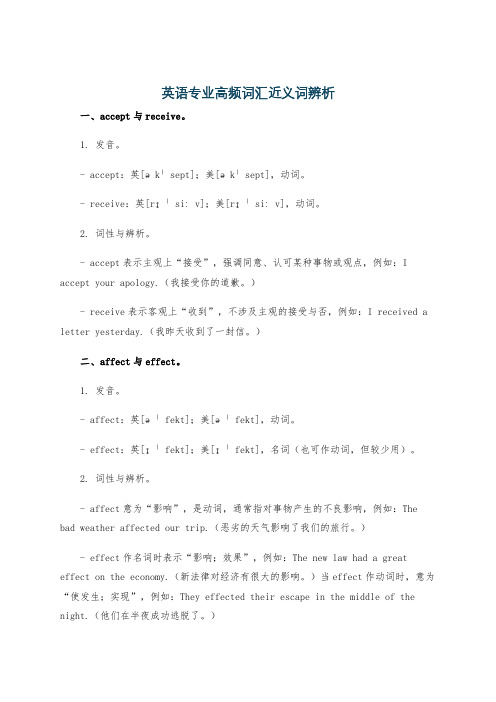
英语专业高频词汇近义词辨析一、accept与receive。
1. 发音。
- accept:英[əkˈsept];美[əkˈsept],动词。
- receive:英[rɪˈsiːv];美[rɪˈsiːv],动词。
2. 词性与辨析。
- accept表示主观上“接受”,强调同意、认可某种事物或观点,例如:I accept your apology.(我接受你的道歉。
)- receive表示客观上“收到”,不涉及主观的接受与否,例如:I received a letter yesterday.(我昨天收到了一封信。
)二、affect与effect。
1. 发音。
- affect:英[əˈfekt];美[əˈfekt],动词。
- effect:英[ɪˈfekt];美[ɪˈfekt],名词(也可作动词,但较少用)。
2. 词性与辨析。
- affect意为“影响”,是动词,通常指对事物产生的不良影响,例如:The bad weather affected our trip.(恶劣的天气影响了我们的旅行。
)- effect作名词时表示“影响;效果”,例如:The new law had a great effect on the economy.(新法律对经济有很大的影响。
)当effect作动词时,意为“使发生;实现”,例如:They effected their escape in the middle of the night.(他们在半夜成功逃脱了。
)三、alive、live、living。
1. 发音。
- alive:英[əˈlaɪv];美[əˈlaɪv],形容词。
- live:英[lɪv];美[lɪv](作动词时);英[laɪv];美[laɪv](作形容词时),可作动词和形容词。
- living:英[ˈlɪvɪŋ];美[ˈlɪvɪŋ],形容词。
2. 词性与辨析。
- alive表示“活着的”,多作表语,不能作前置定语,例如:The fish is still alive.(这条鱼还活着。
高考英语词汇辨析全解篇.

英语听课笔记整理1.Accuse sb of sth 控告....罪行/指责....人犯罪Charge sb with sth 只能用于控告某人犯有.....罪Accusation n. 控告/指控/指责Charge sb for ... 收费(free of charge)Eg. The little boy charged me 100 RMB for washing my car .Charge 充电Charge my cell phone2.acquire 获得(抽象的东西)如:语言/经验/技巧Gain 和obtain 获得(具体食物)Acquisition 得到/掌握3.BotherDon’t bother(口语)如:别人从你家回去,你去送他,他说:don’t bother (不用了)4.Adopt 采纳;吸收;收养;Adapt 适应;改编Accumulate 积累5.adequate (刚刚好,只是超出一点)Enough 超出很多Sufficient 足够(资源的充分)6advisable 明智的Able-能够/值得Sensible 明智的/意识到的Ible -能够SenseEg. We can sense his pain .Sensitive 敏感的Senseless 无意义的/愚蠢的/无知觉7.effect n 奏效;效果Have effect onEffective adj. 有效的;起作用的Efficient 有效的;高效的Efficiency 效率Affect v 坏的影响Affection for 对一个人有坏的影响——对...产生情感8.afford 一般用can /be bale to负担得起:time /money/ experienceEg . We can’t ~ the time wasted on this project .Affordable adj. 能够负担得起的——can afford to do9.offer sb sth /offer sth to sb 主动提供Offer n.提供一个机会/报价/职位Eg . I will make him an offer he can not refuse .10.run a risk 冒险Omit 删除Attach 粘贴11.Shock(震惊)>astonish惊讶;惊喜>surprise一般惊讶特殊:amaze 对.....出乎意料的好/精彩/美而感到惊讶区别:Be amazed at 对...惊讶Be amused at 对...滑稽/搞笑Muse-fuse -diffuse 融化(把僵硬的表情融化掉)12.Awkward 尴尬/笨拙的Ward- 朝向Inward向内/out ward 向外13.alter 改变(衣服的风格Tailor 裁缝AlterRange from ... To...(范围内的变化)14.be anxious for =be eager for 渴望Be ~ about 对...焦虑Anxious-anxietyEager- eagerness15.in a hurry匆忙但并不仓促In haste 匆忙而仓促/草率Hasty (adj)草率的/仓促的16.appeal to sb 有吸引的/呼吁Appeal to sth /for 肯求17.vanish ——disappear 消失Vanity n. 虚荣心18.Apply...........to 把........应用到....Apple to 对.....适用/适用于.......Eg. The law applies to everyone.Application for 申请To 应用19.appreciate v. 欣赏/感激Appreciate sth感激只可以是物Sb 欣赏人/物Appreciate your helpit that you help meAppreciation n. 欣赏/感激Appreciate doing sth 欣赏/喜欢做某事20.Appoint 任命(官方的正式任命)Appointment 约会(正常的约会)Make an appointment with sb 和谁约会Have an appointment with sb 跟......有个预约Date sb out 把某人约出(情人之间)21.assign sb sth 分配/指派Sb to sthSth to sbAssignment n. 分配/指定22.arrange for sb to do sth 安排某人做某事ArrangementMake an arrangement for对…作安排23.artificial 人造的Fik-fake 假的/赝品Artificial flower 假花limb 假肢fiction 小说/虚构science fiction 科幻小说24.generation gap 代沟Generate 生产/制造(光/热/电/能量)Generator n.发电机25.manually 手动的Manual 手册Artificially 人工的Automatically 自动的Synthetically 合成的26.in addition to /aside from /apart from 除…之外27.assemble 装配/集合/组装As-to semble-look likeAssemble a computer 组装一台电脑Resemble像(长得像)Resemblance to sbEg.He resemblance to his younger brother has resulted in a lot of trouble for his sister-in-law(弟媳)28.associate a with b 把a和b 联系在起来We always associate pumpkin pie with grandma.Association n.协会;联系Association professor 副教授degree 副学位29.sureAssure sb of sth 向某人确信某事Your partner assure you of the safety inside the car .Assurance 使…确信/相信Insure 1.投…保险2.确信Insure …against投保险Insurance polity保险单Ensure 保证/确信You must ensure that all the lights are turned off .Guarantee 确保(商家)30.attachTach –粘贴Attach this picture to the wall.Be attached to 1.附属于2.依恋/恋恋不舍This hospital is attached to suchou university.Attachment 依恋/附件31.tempt 诱惑/使…感兴趣Temp-timeTemptation引诱/诱惑物Attempt 企图/尝试32.all in vain 徒劳无功33.attend 出席Attendant 侍候Attendance 出席;到场34.attribute ...to 把…归因于I attribute all my success to persistent efforts.Attribution n.归因;属性;Girls are usually attracted by noble attributes.35.TitleEntile sb to sth 给某人享有…什么权利/有资格做某事Be entitled to sth /to do sth36.be available to sb /for sthThe assistant is not available for you now.The power is not available for this computer.Availability n.可用性/有效性/实用性37.avoid doing 避免做…Prevent sb from doing 阻止某人做某事Prohibit sb from doing 禁止某人Turn to sb for 向某人求助38.be awake toAwareness 唤醒某人觉悟Arouse one‘s awareness39.clumy 笨拙Awkward 尴尬/笨拙Clum-mud 泥块40.bare hill/feet 光脚Bare 没有覆盖Bare hand 徒手Bald adj 秃顶的/光秃的He killed a tiger with bare hands.He is getting bald. 他的头开始秃了.41.Empty 里面什么都没有Vacant 闲置的/没有被占用vacant seat 闲的Vacant position =空缺的/职位Applied to the manager for this vacancy.Blank 平面上没有涂写(空白页)Blank wall 白墙Hollow 空的/凹的/空腹的44.bar 本义:木块Bargain 讨价/还价/便宜货Gain 获得45.barrier to ...障碍China will be the biggest to us. Ruling of world .46.be based on = on the basis ofBase...观点on...(论据)I base my ideas on facts.47.tragic adj 悲剧的Tragical adj. 悲剧性的;不幸的48.benefit vi. ~ from从...受益Vt.使...获益All the students will benefit from this subject.Gather benefit from ...49.Be preferable to 比 ... 更受欢迎/喜欢Preferable 更好的/更可取的/合意的Female teacher are preferable to boy students than male teachers .50.Partial 偏爱的/偏心的51.Blame sb for sth =scold sb for sth 责备/吗Be to blame for sth 应受到责备(主动表被动)The bus driver is to blame for this traffic accident.Be at fault for 在...有过错52.bold 1.勇敢(鲁莽)2.显目的 ~type 粗体字Brave 勇敢53.timid 懦弱而胆小Shy 害羞的54.cancel 取消Call off 取消Put off推迟doing sthPostpone 推迟post1在...以后2.邮件post officePost-war战后55.be capable of doing sth 有能力做某事CapableCapacity能力本义:容纳/积My capacity for english 我的英语能力To one’s capacity 满载的/达到...最大容量56.PotentialPot 茶壶(在茶壶里煮饺子)——潜力57.eligible 有资格的Permissible 允许的58.make a comment on 就...发表观点/评论Letter of confirmation 确认函Cope with 成功应付/对付mit crime 承认犯罪Be committed to doing 承认做...Commit v.犯罪/使...承担义务Commit ....to....把.....投入哪里去I have committed 100 dollars to this project.Commit oneself to =be committed to doing 全神贯注于...Commitment 承诺/保证China will carry out the commitment he has made.Suicide自杀Sui -me/i/selfCide-kill杀60.insect昆虫Insecticide 杀虫剂pare compare…with…表示“把……与……相比(同类相比)”,compare…to…表示“把……比做……(异类相比,比喻)”。
英语词汇辨析
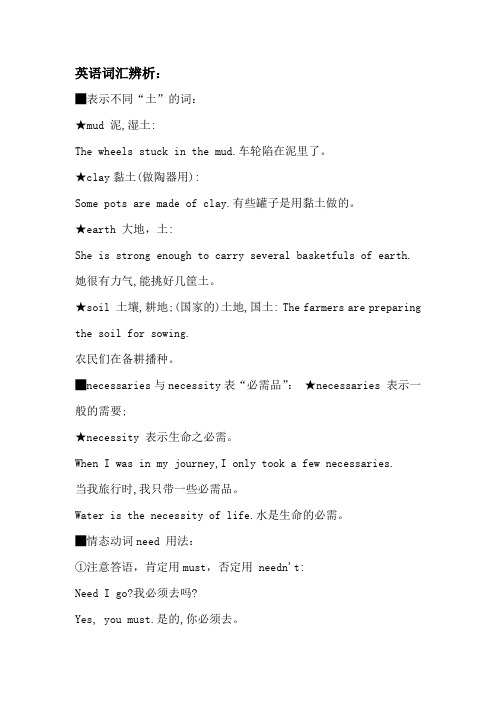
英语词汇辨析:█表示不同“土”的词:★mud 泥,湿土:The wheels stuck in the mud.车轮陷在泥里了。
★clay黏土(做陶器用):Some pots are made of clay.有些罐子是用黏土做的。
★earth 大地,土:She is strong enough to carry several basketfuls of earth. 她很有力气,能挑好几筐土。
★soil 土壤,耕地;(国家的)土地,国土: The farmers are preparing the soil for sowing.农民们在备耕播种。
█necessaries与necessity表“必需品”:★necessaries 表示一般的需要;★necessity 表示生命之必需。
When I was in my journey,I only took a few necessaries.当我旅行时,我只带一些必需品。
Water is the necessity of life.水是生命的必需。
█情态动词need 用法:①注意答语,肯定用must,否定用 needn't:Need I go?我必须去吗?Yes, you must.是的,你必须去。
No, you needn't.不,你不必去。
②need not have done表示某一个已经发生的动作实际上不必发生,常译为"不必…也行”等:He need not have come last night.他昨晚本来无需来的。
(但实际来了)▲比较:He didn't need to come last night.他昨晚不必来。
(实际上也没有来)③过去时用had to,将来时用will have to代替。
█near 和 nearly 的区别★near ①副词②形容词③介词④动词:意思为“近”,“接近”,作副词时还有“几乎”之意。
常见英语词汇辨析
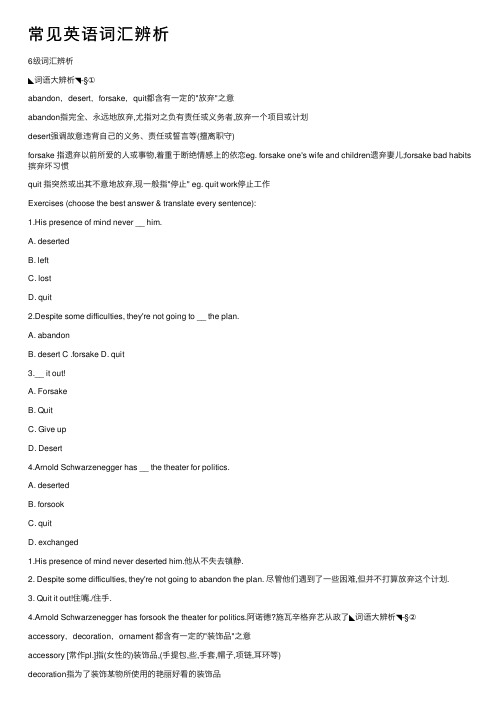
常见英语词汇辨析6级词汇辨析◣词语⼤辨析◥-§①abandon,desert,forsake,quit都含有⼀定的"放弃"之意abandon指完全、永远地放弃,尤指对之负有责任或义务者,放弃⼀个项⽬或计划desert强调故意违背⾃⼰的义务、责任或誓⾔等(擅离职守)forsake 指遗弃以前所爱的⼈或事物,着重于断绝情感上的依恋eg. forsake one's wife and children遗弃妻⼉;forsake bad habits 摈弃坏习惯quit 指突然或出其不意地放弃,现⼀般指"停⽌" eg. quit work停⽌⼯作Exercises (choose the best answer & translate every sentence):1.His presence of mind never __ him.A. desertedB. leftC. lostD. quit2.Despite some difficulties, they're not going to __ the plan.A. abandonB. desert C .forsake D. quit3.__ it out!A. ForsakeB. QuitC. Give upD. Desert4.Arnold Schwarzenegger has __ the theater for politics.A. desertedB. forsookC. quitD. exchanged1.His presence of mind never deserted him.他从不失去镇静.2. Despite some difficulties, they're not going to abandon the plan. 尽管他们遇到了⼀些困难,但并不打算放弃这个计划.3. Quit it out!住嘴./住⼿.4.Arnold Schwarzenegger has forsook the theater for politics.阿诺德?施⽡⾟格弃艺从政了◣词语⼤辨析◥-§②accessory,decoration,ornament 都含有⼀定的"装饰品"之意accessory [常作pl.]指(⼥性的)装饰品,(⼿提包,些,⼿套,帽⼦,项链,⽿环等)ornament指⼀般装饰品(ornament在作动词时常可和decorate互换)Garnish 配菜1. The hall is ___ with flowers and flags.A. fullB. filledC. garnishedD. decorated2.The Christmas tree was decorated with shinning ___ such as colored lights and glass balls.A. ornamentsB. luxuriesC. exhibitsD. complements3.She wore a green wool suit with matching ___.A. decorationsB. ornamentC. accessoriesD. appendix4.Can you help me to ___ a fish with slices of lemon.A. addB. garnishC. decorateD. ornament1.The hall is decorated with flowers and flags.⼤厅⾥装饰着鲜花和旗帜.(此句也能⽤ornament替换.)2.The Christmas tree was decorated with shinning ornaments such as colored lights and glass balls.圣诞树被⼀些闪亮的装饰物点缀着,如彩灯和玻璃球.3.She wore a green wool suit with matching accessories.她穿了⼀件绿⾊的⽺⽑套装,佩戴着得体的⾸饰.4.Can you help me to garnish a fish with slices of lemon.你能帮我在鱼上加配柠檬⽚吗?(garnish多⽤于对烹饪、菜式的装饰,如加调味料,加配材料等)◣词语⼤辨析◥-§③:accomplish,complete,end,finish 都含有"完成"之意accomplish指成功地完成预期的计划或达到预期的⽬的或成果complete指完成⼀件指派或预定的任务,或完善、完整未完成的部分end指⼀个动作或⼀件事情的结束或终⽌finish指把⼀件事或⼀个动作做完,强调事情的了结、终⽌1. We tried to settle the argument but ___ nothing.2.The term will ___ early in July.A. accomplishB. completeC. endD. finish3.The building was ___ in 1962..A. accomplishedB. completedC. endedD. finished4.When will the work be ___.A. accomplishedB. completedC. endedD. finished5.⽐较: I have finished the book.和I have completed a book.分别释为何意呢?我们试图解决争端,但未成功.2.The term will end early in July.学期将在七⽉初结束.3.The building was finished in 1962.⼤厦建成于1962年.4.When will the work be completed.⼯作什么时候完结?5.I have finished the book.我读完了那本书.I have completed a book.我写完了⼀本书.◤词语⼤辨析◢-§.④accurate,correct,delicate,exact,precise都含有⼀定的"正确,精确"之意accurate准确的,精确的,指某⼈或某事不仅不出错,⽽且与事实⽆出⼊,强调准确性correct正确的,指某⼈或某事合乎事实或公认的标准或规则,没有错误delicate精美、精细的、雅致的exact确切的、精确的,语⽓较accurate强,指某⼈或某事数量或质量完全符合事实或标准,⽽且在细致末节上也丝毫不差precise精密的,指具有⾼度的精确性和准确性,强调范围界限的鲜明性或细节的精密,有时略带"吹⽑求疵"的贬义1.His painting is a/an ___ copy of the original./doc/add111e1a517866fb84ae45c3b3567ec112ddcc1.html ser technology has enhanced the ___ of many surgical procedures.A. detailB. costC. exactionD. precision3.We hope to become more ___ in predicting earthquakes.A. exactB. correctC. preciseD. accurate4.It’s the ___ thing to do.A. accurateB. preciseC. exactD. correct5.One of his eyes was injured in an accident, but after a ___ operation, he quickly recovered his sight.A. preciseB. delicateC. considerateD. exact1.His painting is a/an exact copy of the original.他的画是与原作丝毫不差的临摹作品./doc/add111e1a517866fb84ae45c3b3567ec112ddcc1.html ser technology has enhanced the precision of many surgical procedures.激光技术已⼤⼤提⾼了外科⼿术的精确度.3.We hope to become more accurate in predicting earthquakes.我们希望能更准确地预测地震.(be accurate in…在…⽅⾯很精确)4.It`s the correct thing to do.正应如此.recovered his sight.他的⼀只眼睛在事故中受伤,但经过精细的⼿术以后很快恢复了视⼒. ◤词语⼤辨析◢-§.⑤accuse,charge,indict都含有⼀定的"指控,控告"之意indict:具体⽤法见练习3、4、5句1. The soldier was ___ of running away when the enemy attacked.A. scoldedB. chargedC. accusedD. punished2.He ___ me with negligence of duty.A. accusedB. blamedC. chargedD. indicted3.The police ___ him as a rioter.A. indictedB. accusedC. chargedD. punished4.His company ___ him for sabotage.A. accusedB. indictedC. blamedD. charged5.He was ___ on a charge of murder.A. accusedB. chargedC. punishedD. indicted1.The soldier was accused of running away when the enemy attacked.这个⼠兵被指控为临阵逃脱.2. He charged me with negligence of duty.他指控我玩忽职守.3.The police indicted him as a rioter.警察指控他为扰乱治安者.(Indict sb. as…指控某⼈为…)4.His company indicted him for sabotage他公司告发他的破坏⾏为.(indict sb for sth.告发某⼈…)5.He was indicted on a charge of murder.他因犯杀⼈罪被起诉.(sb. be indicted on a charge of …因犯…被告发)◤词语⼤辨析◢-§.⑥achieve, acquire, attain, gain, obtain都含有⼀定的"获得,达到"之意achieve强调由于极⼤的努⼒,克服困难后达到⽬标attain正式⽤语,指经过艰苦努⼒才使⼈达到完美境地gain指需要做出⽐obtain更⼤的努⼒,往往指通过竞争获得某些有价值的东西obtain指经过努⼒或付出代价或经过很长时间⼉得到所需要的东西1. After so many years of hard work, he finally ___ success.A. obtainedB. acquiredC. achieved D .gained2.She has ___ some very unpleasant habits recently.A. obtainedB. gainedC. attainedD. acquired3.In typhoon, winds ___ a speed greater than 120 km per hour.A. assumeB. accomplishC. attainD. assemble4.In the second experiment they ___ a very clear result.A. obtainedB. acquiredC. wonD. attained5.No ___ without pains.A. obtainsB. gainsC. attainsD. acquires6.She ___ a good knowledge of English from Mr. Chen's lectures.A. achievedB. attainedC. acquiredD. gained1.After so many years of hard work, he finally achieved success.经过这么多年努⼒,他终于获得了成功.2.She has acquired some very unpleasant habits recently.她最近养成了⼀些不良的习惯.4.In the second experiment they obtained a very clear result.在第⼆次试验中他们的到了⼀个⾮常清楚的结果.5.No gains without pains.不劳则⽆获.6. She acquired a good knowledge of English from Mr. Chen's lectures.他从陈教授的讲座中学到很多英语知识.◤词语⼤辨析◢-§.⑦acknowledge, admit, concede, confess, recognize都含有⼀定的"承认"之意acknowledge着重”公开承认”,常⽤来指过去曾隐瞒或否认的事admit是指在压⼒下不得不承认已经证实或难以否认的事实,供认(事实,错误等)concede (不情愿地)承认,(在结果确定前)承认失败confess着重承认⾃⼰的过错或罪恶recognize指正式承认主权、权利等1. He ___ that the statement was true in an argument.A. concededB. admittedC. confessedD. recognized2.She ___ having been at fault.A. admittedB. confessedC. acknowledgedD. recognized3.The new law was generally admitted ___ difficult to enforce.A. beingB. to beingC. to beD. to have4.Although they had suffered heavy losses, they refused to ___ defeat.A. concedeB. conserveC. admitD. assert5.Finally he has to ___ himself guilty.A. concedeB. confessC. admitD. acknowledgeA. acknowledgeB. admittedC. concededD. recognizedA.C.C.A.B.D1.He conceded that the statement was true in an argument.他在辩论中承认对⽅的说法是正确的.(有点不情愿的承认)2.She acknowledged having been at fault.他承认⾃⼰曾犯过错误.3.The new law was generally admitted to be difficult to enforce.⼤家普遍认为,新的法律很难实施.(admit后⾯可跟名词或动名词作宾语, 不根不定式作宾语,但可接不定式作宾补. 此句中admit为被动结构,所以⽤to be difficult to enforce作主语补语.)4.Although they had suffered heavy losses, they refused to concede defeat.虽然他们已遭受惨重损失,但还是不肯认输.5.Finally he has to confess himself guilty.最终他不得不认罪.(confess oneself认罪)6.Mr.Zhang was recognized as the legitimate representative of the company.张先⽣背城认为公司的合法代表.◤词语⼤辨析◢-§⑧affirm,assert,allege,claim都含有⼀定的"宣称,断⾔"之意affirm断⾔,肯定,指根据事实坚定不移地宣称,有⽆可争辩之意assert宣称,坚持,指不管事实如何,主观⾃信地宣称allege宣称,断定,指在⽆真实凭据情况下宣称,硬说claim声称,主张,往往表⽰说话者反对或不同意某⼀观点1. Politicians more often___ their desire for retirement than show that they really mean it.A. assertB. claimC. allegeD. affirm2.The suspect ___ that he had not been in the neighborhood.A. advocatedB. allegedC. addressedD. announced3.He ___ his belief that she was innocent.A. affirmedB. assertedC. maintained4.He ___ that this could be done.A. affirmedB. allegedC. assertedD. claimed5.Don’t ___ to know what you don’t know.A. claimedB. assertedC. allegedD. affirmed1.Politicians more often affirm their desire for retirement than show that they really mean it.政治家经常声称他们想退休,但未必是真的.2.The suspect alleged that he had not been in the neighborhood.嫌疑犯⽣成案发时他并不在现场.3.He asserted his belief that she was innocent.他坚持⾃⼰的想法,她是⽆辜的.4.He asserted that this could be done..他宣称这是可⾏的.5.Don't claim to know what you don't know.不要强不知以为知.◤词语⼤辨析◢-§⑨alarm, dread, fear, fright, horror, panic, terror都含有⼀定的"惊恐"之意alarm惊恐,忧虑,指突然遇到危险产⽣的紧张,害怕,惊慌失措的⼼理状态,也可指⼀般的担⼼忧虑(take/feel alarm at…因…⽽惊恐) dread担忧,惧怕,多指因预料有危险和不愉快的事⾯临⽽产⽣的不安⼼情,⽐fear更为强烈的恐惧fear表⽰恐惧最普通的⽤语,指遇到危险或灾难内⼼感到不安或发慌fright指突然的惊恐horror令⼈⽑⾻悚然,使⼈极其厌恶的恐怖(常⽤于强调表现出恐怖的现象或⾏为,⽽不强调引起恐怖的原因)panic恐慌(指吃惊以后随之⽽来的不知所措,神经⼏乎失控的状态)terror恐怖(指个⼈安全受到严重威胁时所产⽣的巨⼤恐惧及惊骇)1. There is nothing to get ___ about.A. alarmedB. fearedC. horrifiedD. terrified2.She had always been in ___of meeting with an accident.A. horrorB. alarmC. terror3.Our cat ___ dogs.A. alarmsB. fearsC. panicsD. dreads4.I don't ___ easily.A. fearB. dreadC. frightenD. alarm5.They watch with ___ as the tightrope walker struggled to remain his balance.A. panicB. alarmC. horrorD. terror6.All the residents of the town ___ when there was a big fire in the supermarket.A. panicB. panickedC. surprisedD. shocked7.She was ___ out of her senses.A. alarmedB. fearedC. horrorD. terrified1.There is nothing to get alarmed about.没什么可⼤惊⼩怪的.2.She had always been in dread of meeting with an accident.他总是担⼼遇上意外事故.3.Our cat fears dogs.我们家的猫怕狗.4.I don't frighten easily.我不会轻易受惊的.5.They watch with horror as the tightrope walker struggled to remain his balance.他们⼼惊⾁跳得看着⾛钢丝绳的演员摇摇晃晃地在恢复平衡.6.All the residents of the town panicked when there was a big fire in the supermarket.超市的⼀场⼤⽕震惊了全镇居民.(panic 的过去式为panicked)7.She was terrified out of her senses.她吓得魂不附体.◤词语⼤辨析◢-§⑩alter改变,变更,指⾐服等表⾯或局部做部分变动,⽽没有变成另⼀种事物change改变,变更,指位置,性质,外表,形式或是数量与质量等改变.常与into连⽤.convert使转变,变化,⼀般只表⽰事物的外表及⽤途等⽅⾯发⽣的次要变化,⽽不是本质上的巨⼤变化,也可⽤于改变某⼈的政治观点、信仰.这个词义是其他词所没有的modify修改,变更,较正式,常⽤以表⽰意见,计划或形式,质量⽅⾯不⼤的变化shift指位置或⽅向的移动,改变transform指外形或⾯貌的改变,彻底改变性格,性质等vary改变,不同,有区别,变化1.If your coat is too long,the tailor can___it to fit you.A.alterB.convertC.changeD.modify2.Great ___ have taken place since he left.A.altersB.convertsC.changesD.transforms3.He used to be a Christian,but he is now___ to Buddhism.A.convertedB.changedC.transformedD.reformed4.Prices that ___ with the quality.A.shiftB.varyC.convertD.alter5.The wind has ___ from north to south.A.shiftedB.convertedC.alteredD.transformed6.Many military factories have been ___ into civil ones in order to meet the needs of the country.A.alteredD.transformed7.The inventor ___ his original design in order to increase the machine’s effiency.A.exchangedB.convertedC.modifiedD.cultivated1.If your coat is too long,the tailor can alter it to fit you.如果你的⾐服太⼤,裁缝会给你改的合⾝.2.Great changes have taken place since he left.他⾛后变化很⼤.3 He used to be a Christian,but he is now.converted to Buddhism.他过去是⼀个基督教徒,现在改信佛教.4.Prices that vary with the quality.价格随质量不同⽽变化.(vary with…随…⽽变化)5.The wind has shifted from north to south.风向从北转到了南.6.Many military factories have been transformed into civil ones in order to meet the needs of the country.为了适应国情的需要,我们把很多军⽤⼯⼚改成了民⽤⼯⼚.7.The inventor modified his original design in order to increase the machine’s efficiency.发明者改变原来的设计⽬的是提⾼机器的效率.◤词语⼤辨析◢-§⑾alternative,choose,pick,select都含有⼀定的"选择"之意alternative adj. n.供选择的,抉择,供选择的东西.指在两者之间进⾏选择,两者选⼀的choose适⽤范围最⼴,指从众多的对象中挑选,这中挑选常取决于个⼈的意志与判断,不强调客观标准.它所选择的对象可以是不同种类的,可以是有形的或⽆形的.还常带有最终选定的含义,即表⽰选定候不再变化.pick⼝头⽤语,指仔细地,精⼼地选择,含有挑剔的意思.⼀般指挑选有形的东西select语⽓⽐choose重,多⽤于正式场合.指仔细地,审慎地精选,强调客观性,⽽不是主观性.所挑选的对象可以是有形或⽆形的,但⼀定是同种类的.1.He ___an appropriate birthday card for his mother.A.choseB.pickedC.selectedD.elected2.Children shouldn't ___ food.A.pick offB.pickC.chooseD.select3.He ___ Miss Lilyfor his wife.A.chose4.When traveling,you are advised to take travelers' checks,which provide a secure ___ to carrying your money in cash.A.preferenceB.selectionC.choiceD.alternative5.I'm to ___ a few good books to send to my friend.A.chooseB.pick upC.pick outD.pick at1.He selected an appropriate birthday card for his mother.他给母亲精⼼挑选了⼀张合适的⽣⽇卡.2.Children shouldn’t pick food.孩⼦不应该挑⾷.(pick off摘去,采取)3 He chose Miss Lilyfor his wife.他选择了莉丽⼩姐作为他的妻⼦.(从本句可以看出"choose 常带有最终选定的含义"这⼀点)4.When traveling,you are advised to take travelers' checks,which provide a secure alternative to carrying your money in cash.建议你旅游时带旅⾏⽀票,那样要⽐带现⾦安全.5.I'm to pick out a few good books to send to my friend.我要挑选⼏本好书给我的朋友.(pick up收拾整理,⽤车接⼈pick out挑选,拣出pick at吃⼀点点,⽆⾷欲地吃)◤词语⼤辨析◢-§⑿altitude,aptitude,attitude,latitude都⾮常形近altitude⾼度,海拔(an altitude of 20,000 metres above sea level海拔20,000⽶)aptitude才能,智⼒,倾向,习性attitude态度,看法latitude纬度(longitude经度)1.Beavers have an ___ for building dams.A.altitudeB.aptitudeC.attitude/doc/add111e1a517866fb84ae45c3b3567ec112ddcc1.html titude2.She takes the ___ that Children should be allowed to learn at their own pace.A.altitudeB.aptitudeC.attitude/doc/add111e1a517866fb84ae45c3b3567ec112ddcc1.html titudeC.attitude/doc/add111e1a517866fb84ae45c3b3567ec112ddcc1.html titude4.What's your ___ towards this question?A.altitudeB.aptitudeC.attitude/doc/add111e1a517866fb84ae45c3b3567ec112ddcc1.html titude5.Taipei is located at 121.7 degrees east longitude and 25 degrees north ___.A.altitudeB.aptitudeC.attitude/doc/add111e1a517866fb84ae45c3b3567ec112ddcc1.html titude6.The pilot is exercising the ___ flight.A.altitudeB.aptitudeC.attitude/doc/add111e1a517866fb84ae45c3b3567ec112ddcc1.html titude1.Beavers have an aptitude for building dams.⽔獭有筑坝的习性.2.She takes the attitude that Children should be allowed to learn at their own pace. 她采取的态度就是应该允许孩⼦们按照⾃⼰的节奏学习.3 He has an aptitude for languages.他有学语⾔的才能.4.What's your attitude towards this question?你对这个问题有什么看法?5.Taipei is located at 121.7 degrees east longitude and 25 degrees north latitude.台北位于东经121.7度,北纬25度.6.The pilot is exercising the altitude flight.飞⾏员正在练习⾼空飞⾏.◤词语⼤辨析◢-§⒀announce, declare, proclaim都含有⼀定的"宣布"之意announce指对公众或特定的⼀群关⼼的⼈进⾏宣布,常指⼤家感兴趣的事,如国家⼤事、商品信息、⽣死病婚、开会等新闻declare指在庄严场合,官⽅权威⼈⼠公开郑重宣布,有时指在公共场合对某事表明态度proclaim指官⽅事务中当局对⼤众所作的重要宣布其实,三个词之间有时也可经常互换使⽤.1.Everyone was silent as he ___ the winner of the competition.A.toldB.declared2.The government ___ war on the drug dealers.A.statedB.declaredC.announcedD.claimed3.They ___ him a model worker.A.statedB.declaredC.prizedD.proclaimed4.The chairman ___ the exhibition open.A.statedB.declaredC.spokeD.proclaimed5.The Congress of the Communist Party of China was ___ to meet in the paper.A.statedB.declaredC.announcedD.proclaimed1.Everyone was silent as he announced the winner of the competition.当他宣布竞赛的获胜者时,⼤家都静静地倾听.2.The government declared war on the drug dealers.政府向毒品贩⼦宣战.(declare war on/against…向…宣战;proclaim war宣战)3.They proclaimed him a model worker..它们宣布他为劳动模范.4.The chairman declared the exhibition open.主席宣布展览会开幕.(本句感觉也可⽤announced,你认为呢?)5.The Congress of the Communist Party of China was announced to mee◤词语⼤辨析◢-§⒁ample, adequate, plentiful,sufficient都含有⼀定的"⾜够,丰富"之意ample指不仅能达到应有的程度,满⾜需要,⽽且还有余,⼀般修饰数量不定的名词(ampletime充裕的时间;an ample basket of fruit满满⼀篮⽔果;ample space宽敞的空间) adequate⾜够的,充分的,指数量和质量上复合⼀个特定的标准或不太⾼的要求plentiful丰富的,很多的,富裕的sufficient尤指程度上多到能满⾜或达到某种特殊需要,特别是精神上的需要1.There is ___ evidence to suggest that the lawyer in question knew exactly what she was doing.C.adequateD.ample2.By law,when one makes a large purchase,he should have ___ opportunity to change his mind.A.accurateB.urgentC.adequateD.excessive3.The supply is not ___ to the demand.A.sufficientB.plentifulC.adequateD.ample4.He has acquired ___ proficiency to read Chinese literary works.A.sufficientB.plentifulC.adequateD.ample5.A ___ harvest is in sight.A.sufficientB.plentifulC.adequateD.ample1.There is ample evidence to suggest that the lawyer in question knew exactly what she was doing.有充分证据表明那个正在提问的律师确实知道她在做什么.(ample evidence充分证据)2.By law,when one makes a large purchase,he should have adequate opportunity to change his mind.根据法律,当⼀个⼈进⾏⼤宗购买时,他应该有充分的机会改变⾃⼰的注意.3.The supply is not adequate to the demand.供不应求.4.He has acquired sufficient proficiency to read Chinese literary works.他已获得⾜够能⼒阅读中国⽂学著作.5.A plentiful harvest is in sight.丰收在望.(plentiful/good harvest丰收)◤词语⼤辨析◢-§⒂amplify, enhance, enlarge,expand,magnify都含有⼀定的"扩⼤,提⾼"之意amplify放⼤,扩⼤,增强,指放⼤,增强(信号等)enhance提⾼,增强,指(价格,⼒量,吸引⼒,声望)等的增加,提⾼.enlarge指体积,⼤⼩,范围,能⼒等⽅⾯的增加magnify指放⼤,扩⼤(声⾳,照⽚等)1.Human knowledge has greatly ___ in the last 30 years which enables people to achieve more and live more comfortably.A.enlargedB.expandedC.enhancedD.amplified2.Please ___ a radio signal.A.amplifiedB.expandedC.enhancedD.enlarged3.The republication of the poet’s most recent works will certainly ___ his national reputation.A.magnifyB.expandC.enhanceD.amplify4.People often use a loudspeaker to ___ the voice.。
英语专四词汇辨析
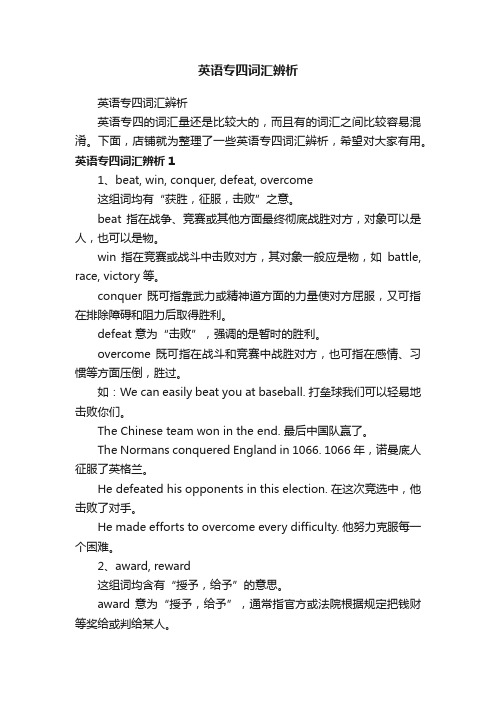
英语专四词汇辨析英语专四词汇辨析英语专四的词汇量还是比较大的,而且有的词汇之间比较容易混淆。
下面,店铺就为整理了一些英语专四词汇辨析,希望对大家有用。
英语专四词汇辨析11、beat, win, conquer, defeat, overcome这组词均有“获胜,征服,击败”之意。
beat 指在战争、竞赛或其他方面最终彻底战胜对方,对象可以是人,也可以是物。
win 指在竞赛或战斗中击败对方,其对象一般应是物,如battle, race, victory等。
conquer 既可指靠武力或精神道方面的力量使对方屈服,又可指在排除障碍和阻力后取得胜利。
defeat 意为“击败”,强调的是暂时的胜利。
overcome 既可指在战斗和竞赛中战胜对方,也可指在感情、习惯等方面压倒,胜过。
如:We can easily beat you at baseball. 打垒球我们可以轻易地击败你们。
The Chinese team won in the end. 最后中国队赢了。
The Normans conquered England in 1066. 1066年,诺曼底人征服了英格兰。
He defeated his opponents in this election. 在这次竞选中,他击败了对手。
He made efforts to overcome every difficulty. 他努力克服每一个困难。
2、award, reward这组词均含有“授予,给予”的意思。
award 意为“授予,给予”,通常指官方或法院根据规定把钱财等奖给或判给某人。
reward 意为“酬劳,奖赏”,通常指因做了某一件事或提供了某种服务而应得到的报答或酬谢。
如:He was awarded a medal for his outstanding contribution to science. 由于对科学作出了杰出贡献,他被授予一枚奖章。
英语词汇辨析方法
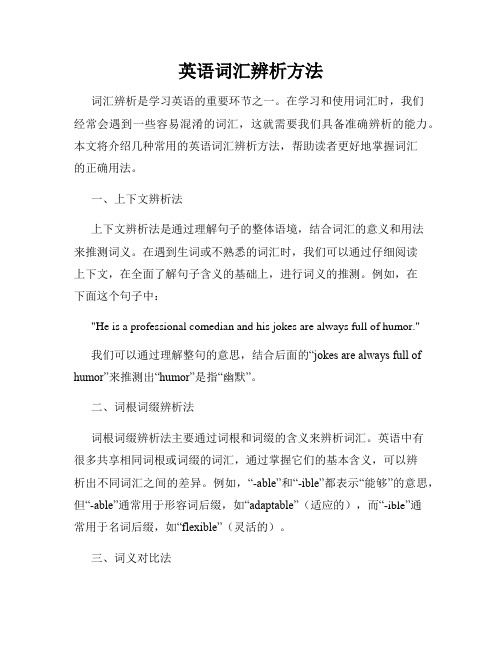
英语词汇辨析方法词汇辨析是学习英语的重要环节之一。
在学习和使用词汇时,我们经常会遇到一些容易混淆的词汇,这就需要我们具备准确辨析的能力。
本文将介绍几种常用的英语词汇辨析方法,帮助读者更好地掌握词汇的正确用法。
一、上下文辨析法上下文辨析法是通过理解句子的整体语境,结合词汇的意义和用法来推测词义。
在遇到生词或不熟悉的词汇时,我们可以通过仔细阅读上下文,在全面了解句子含义的基础上,进行词义的推测。
例如,在下面这个句子中:"He is a professional comedian and his jokes are always full of humor."我们可以通过理解整句的意思,结合后面的“jokes are always full of humor”来推测出“humor”是指“幽默”。
二、词根词缀辨析法词根词缀辨析法主要通过词根和词缀的含义来辨析词汇。
英语中有很多共享相同词根或词缀的词汇,通过掌握它们的基本含义,可以辨析出不同词汇之间的差异。
例如,“-able”和“-ible”都表示“能够”的意思,但“-able”通常用于形容词后缀,如“adaptable”(适应的),而“-ible”通常用于名词后缀,如“flexible”(灵活的)。
三、词义对比法词义对比法是通过比较相似词汇的不同之处来辨析词义。
相似的词汇往往只有细微的差别,我们需要仔细观察这些差别从而准确使用词汇。
例如,“big”和“large”都表示“大的”,但“big”更侧重于尺寸的大小,而“large”更偏向于数量或规模的大。
四、语法结构辨析法语法结构辨析法是通过词汇所在的语法结构来辨析词义。
英语中不同的词汇常常会出现在不同的语法结构中。
我们可以通过理解句子的语法结构,推测出词汇的意义。
例如,“look forward to”是一个固定搭配,意思是“期待”,而“look at”则表示“看”。
五、熟词生义辨析法熟词生义辨析法是指通过熟悉的词汇的新意义来辨析其他词汇。
英语词汇辨析
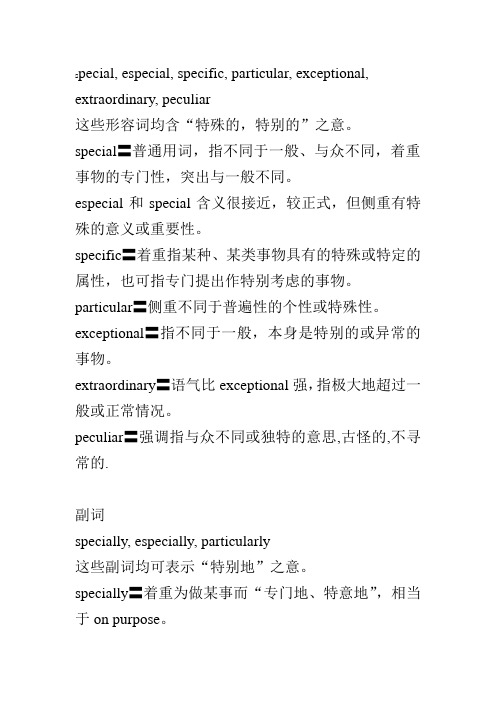
s pecial, especial, specific, particular, exceptional, extraordinary, peculiar这些形容词均含“特殊的,特别的”之意。
special〓普通用词,指不同于一般、与众不同,着重事物的专门性,突出与一般不同。
especial和special含义很接近,较正式,但侧重有特殊的意义或重要性。
specific〓着重指某种、某类事物具有的特殊或特定的属性,也可指专门提出作特别考虑的事物。
particular〓侧重不同于普遍性的个性或特殊性。
exceptional〓指不同于一般,本身是特别的或异常的事物。
extraordinary〓语气比exceptional强,指极大地超过一般或正常情况。
peculiar〓强调指与众不同或独特的意思,古怪的,不寻常的.副词specially, especially, particularly这些副词均可表示“特别地”之意。
specially〓着重为做某事而“专门地、特意地”,相当于on purpose。
especially〓较多地用于正式文体,侧重超过其它全部,突出到“特别地”的程度,相当于in particular。
particularly〓用来指同类中特别突出的一个。
especial,special,particular,peculiar的区别?(1)This is an expression ____ to the local people and can't be understood.(2)The president will take his own ____plane for H.K.(3)Each person's fingerprints are ____ to himself.(4)We'dbetter not waste time on such problem of no ____ value.答:①填peculiar=belonging only to sb. / sth.独有的、独特的,常构成peculiar to sb./ sth.作“专门的、特别的”义=special, particular②special“专门的”=designed or arranged for a particular purpose本句中为意“专机”③particular“个别的、特有的”=single and different from others“指纹是个人特有的”但一般作定语,故此处peculiar最佳,常与to连用。
英语词汇辨析
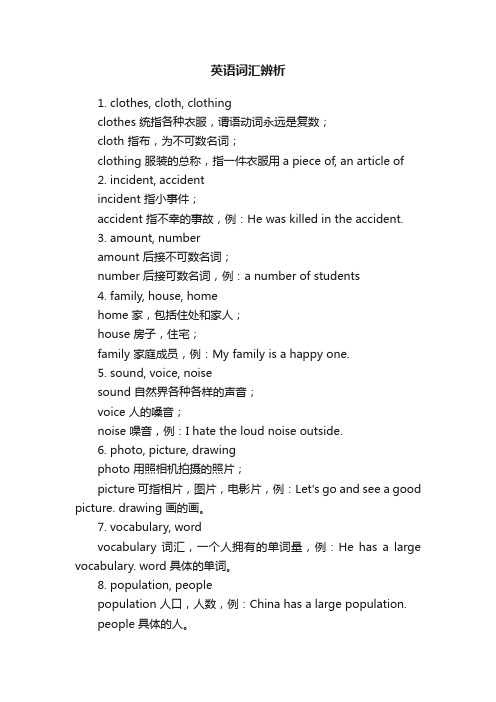
英语词汇辨析1. clothes, cloth, clothingclothes 统指各种衣服,谓语动词永远是复数;cloth 指布,为不可数名词;clothing 服装的总称,指一件衣服用a piece of, an article of2. incident, accidentincident 指小事件;accident 指不幸的事故,例:He was killed in the accident.3. amount, numberamount 后接不可数名词;number 后接可数名词,例:a number of students4. family, house, homehome 家,包括住处和家人;house 房子,住宅;family 家庭成员,例:My family is a happy one.5. sound, voice, noisesound 自然界各种各样的声音;voice 人的嗓音;noise 噪音,例:I hate the loud noise outside.6. photo, picture, drawingphoto 用照相机拍摄的照片;picture 可指相片,图片,电影片,例:Let's go and see a good picture. drawing 画的画。
7. vocabulary, wordvocabulary 词汇,一个人拥有的单词量,例:He has a large vocabulary. word 具体的单词。
8. population, peoplepopulation 人口,人数,例:China has a large population.people 具体的人。
9. weather, climateweather 一天内具体的天气状况;climate 长期的气候状况,例:The climate here is not good for you.10. road, street, path, wayroad 具体的公路,马路,例:take this roadstreet 街道,例:in the streetpath 小路,小径;way 道路,途径,例:Show me the way to the museum11. course, subjectcourse 课程(可包括多门科目),例:a summer coursesubject 科目(具体的学科)12. custom, habitcustom 传统风俗,习俗,也可指生活习惯,后接to do;habit 生活习惯,习惯成自然,后接of doing. 例:I've got the habit of drinking a lot.13. cause, reasoncause 指造成某一事实或现象的直接原因,后接of sth./doing sth;reason 用来解释某种现象或结果的理由,后接for sth./doing sth. 例:the reason for being late14. exercise, exercises, practiceexercise 运动,锻炼(不可数);exercises 练习(可数);practice(反复做的)练习,例:Practice makes perfect.15. class, lesson作“课”解时,两者可以替换。
- 1、下载文档前请自行甄别文档内容的完整性,平台不提供额外的编辑、内容补充、找答案等附加服务。
- 2、"仅部分预览"的文档,不可在线预览部分如存在完整性等问题,可反馈申请退款(可完整预览的文档不适用该条件!)。
- 3、如文档侵犯您的权益,请联系客服反馈,我们会尽快为您处理(人工客服工作时间:9:00-18:30)。
jewelry & jewelry & jewel
1) jewel 意思是“珠宝;首饰”,为可数名词。 2) jewellery 和jewelry 均为正确拼写,但前者在英国英语 中更为常见。jewellery/jewelry与jewel相同,但它是珠宝 的总称,为不可数名词。 e.g. This watch has 17 jewels.这块手表是17钻的。 She has a small box to keep her jewellery. 她有一个小盒子存放方珠宝。 We buy jewelry from a jeweler’s shop. 我们从珠宝商店购买珠宝首饰。 She appeared at the reception wearing her finest jewels. 她佩戴着最好的首饰出现在招待会上。
Unit 7 Vocabulary Discrimination
envelope & envelop meanwhile & meantime protect & protest couple & pair consult & consult with jewelry & jewelry & jewel remind loyalty & royalty
remind
remind意指“使…想起”,跟of 引起的短语或从句。 remind意指“提醒”,表示“提醒某人去做某事”,跟复 合宾语。 e.g. This photo reminds me of the old days. 这张照片使我想起了过去的日子。 He reminded me to visit the museum. 他提醒我去参观博物馆。 The sight of the clock reminded me that I was late. 看到了钟表我才想到我已经迟到了。 Remind me to take my medicine tomorrow. 提醒我明天吃药。
couple & pair
两词均可表示“一双;一对”,但含义不同。
couple 指同一类别中相关的两者,亦可表示“一对夫妻”或“合 作者”。 pair指由两个部件组成的东西,若分开则不能单独使用。
e.g. He has five couples of rabbits. 他有5对兔子。 He bought a new pair of scissors. 他买了一把新剪刀。 The couple are married. 这一对结婚了。 a pair of shoes / glasses 一双鞋/一副眼镜
protect & protest
这两个词音形相近,但词义不同,不要混淆。
protect意思是“保护;防护”。 protest意思是 There was a large crowd in the square, protesting against the war. 广场上聚集着一大群人,反对这场战争。 Our government is taking measures to protect wildlife resources. 我国政府正在采取措施保护野生资源。 They protested about the bad food at the hotel. 他们对旅馆糟糕的伙食提出抗议。 Use an umbrella to protect yourself from the rain. 用伞来挡雨。
consult & consult with
1) consult sb. 表示“向…请教”; consult with sb. 表示“和…商量;同…讨论” 2) consult后面接物时,表示“参考;查阅;翻阅”,其 宾语一般为字典、参考书等,注意用此义时,不用with。 e.g. He consulted the layer. 他向律师请教。 She consulted with me about what we should do next . 她和我商量我们下一步怎么做。 Mary consulted her notebook and said, “I could come tomorrow.” 玛丽翻了一下笔记,说“我明天可以来。” He consulted the dictionary and told me the meaning of the new word. 他查了字典告诉了我那个生词的意思。
meanwhile & meantime
这两个词意思相同,表示“其时;其间;同时”,但实际 运用中应注意: 1) meanwhile用常用作副词。 2) meantime一般用作名词,且常用于in the meantime短 语中。 e.g. In the meantime let us do the things we can. 在此期间,让我们做些我们能做的事情。 They’ll be here in ten minutes. Meanwhile, we’ll have some coffee. 他们10分钟后到,他们到前我们来喝点儿咖啡。 Eve was cutting the grass, and Adam was meanwhile planting roses. 夏娃在除草,亚当则在种玫瑰。
envelope & envelop
二词词形极其相似,但发音和意义不同。 1)envelope为名词,“信封,包裹物”的意思。 2)envelop:/in'velp/ 是动词,“包;裹;包围”的 意思。 e.g. The baby was enveloped in blankets. 新生儿用毯子裹着。 Clouds will soon envelop the mountain top. 云马上就会将山顶包围。 Please fold the letter and put it in the envelope. 请把信叠起来放进信封里。
loyalty & royalty
这两个词音形相近,但词义不同。 loyalty意思是“忠诚;忠心;忠实”。 royalty意思是“王位;王权;王族;皇室”。另外,其复 数形式royalties还有“版税”的意思。 e.g. The crown is a symbol of royalty.王冠是王权的象征。 Loyalty, like love, can’t be forced. 忠诚和爱情一样是不能强迫的。 It was not an official visit by royalty. 那不是一次皇室的官方访问。 Once he took the vow his loyalty never wavered. 一旦宣誓,他的忠诚就绝不动摇。
